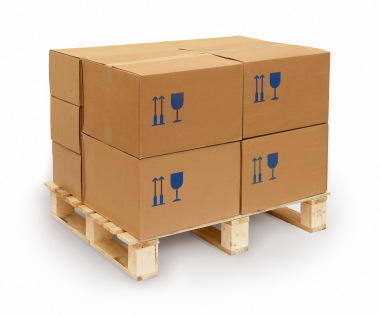Today I am going to answer the questions, what is a less than truckload shipment? Mainly because there is a lot of confusion about how LTL works and the advantages and disadvantages.
Define less than truckload shipping?
Less-than-truckload shipments, also known as less than a load, less than load or LTL, take up less than a full truckload and typically weighs between 150 lbs and 20,000 lbs.
Most less than truckload shipments are shipped on pallets and only require a portion of the trailer space.
What is the LTL Shipping Process?
LTL carriers focus on consolidating many shippers cargo into truckloads and then transport them long distances between hubs or terminals, where they will eventually get delivered to their final destination by a local truck and drivers. The long distance shipment between hubs or terminals is typically referred to as the line haul.
Most LTL carriers are focused on making local deliveries in the morning and once all the deliveries have been made, they start aggregating local pickups so they can return to the terminal to start the consolidation process.
Once a less than load shipments have been sorted and consolidated into truckloads they head off to the next terminal where they will either be sent out for local delivery or loaded onto another truck for delivery to another terminal. As you can see LTL shipments may only be handled once or they may be handled multiple times before final delivery.
What are the Advantages of LTL Shipping?
The primary advantage to using an LTL carrier is the savings it can offer as compared to shipping via a truckload carrier. In most cases LTL is significantly cheaper than truckload because with an LTL carrier you are only paying for the portion of the truck you are using, versus a truckload where you are buying the exclusive use of the whole trailer.
1. Cost Savings:
One of the primary advantages of less than load shipments is lower costs. Since shippers only pay for the space they use within the trailer, it is the more economical option for smaller loads. This contrasts with FTL shipments where the entire trailer must be paid for, regardless of cargo volume. The ability to share space with other shippers helps bring down the shipping costs, making LTL a cost-effective choice for businesses with moderate shipping needs.
2. Service Flexibility:
Another benefit comparing LTL carriers to FTL is the wider range of additional services. LTL carriers often provide a range of services offered to shippers. These services may include lift-gate assistance, residential pickup/delivery, inside delivery, and notification prior to delivery. This flexibility allows businesses to custom tailor their shipping solutions based on their specific shipping needs at any given time.
3. Access to Smaller Markets:
In addition to the cost savings and service flexibility, LTL shipments can help businesses to reach smaller regional markets more efficiently. Since LTL carriers consolidate shipments from multiple shippers into a single truckload, LTL shipments are available to businesses with lower shipping volumes. This is especially beneficial for smaller companies such as those operating in niche markets.
4. Additional Services
In addition, LTL carriers also offer a variety of services that most truckload carriers do not including: lift-gate, residential pickup/delivery, inside delivery, notification prior to delivery and more.
What are the Disadvantages of LTL Shipping?
MORE FREIGHT CLAIMS: The disadvantage to LTL is a significantly higher ratio of freight claims as compared to full truckload, primarily due to the amount of handling that takes place from pickup throughout the delivery process.
ADDITIONAL COST TO INSURE: As well as the fact that unless you purchase additional insurance on your shipment, most freight is only insured for a fraction of the actual value which typically range from $.10 per pound up to $25 per pound based upon the fair market value of that product as deemed by the LTL carrier.
SLOWER THAN FULL TRUCKLOAD: Another disadvantage to using LTL carriers is the fact that due to the amount of handling that takes place it typically slows down the delivery process. For example a full truckload shipment that can go from Buffalo, NY to Los Angeles, CA in 4 to 4.5 days might take 5, 6, or even 7+ days business days.
Understanding Less than Truckload Pricing
LTL pricing can be difficult to understand but is primarily dependent upon the class, weight and discount rate. LTL freight is classified into 17 different classes ranging from class 50 to 500. Typically the higher the class the higher the per pound rate will be.
The current LTL rating system can be confusing to both shippers and freight brokers due to the complexity and ambiguity that the class based structure creates. Beyond freight class many times you will here shippers say, “I have a 75% discount” which means they are able to negotiate a 75% discount off of the carriers base rate.
LTL Shipping Classes
Standard LTL shipments are classified based on the characteristics of the freight. The following classification system is designed to standardize shipping rates based on several factors including the ease of handling, value, and special freight considerations.
The classes range from Class 50 to Class 500 and increase in shipping considerations including the difficulty of handling, weight, and value as the class increases.
Below is the current list of the LTL freight classes:
- Class 50 – Example include industrial nuts, bolts and steel rods
- Class 55
- Class 60
- Class 65
- Class 70 – Examples include forklift batteries and automobile engines
- Class 77.5
- Class 85
- Class 92.5
- Class 100 – Examples include boat covers, car covers, wine cases
- Class 110
- Class 125
- Class 150 – Examples include ATV’s, jetskis and motorcyles
- Class 175
- Class 200
- Class 250 – Examples Include mattresses, boxsprings and bamboo furniture
- Class 300
- Class 400
- Class 500 – Examples include gold bars, ping pong balls and feathers
Top LTL Providers
It’s important for shippers to accurately determine the class of their freight as it directly impacts shipping rates. Freight classification helps ensure fair and standardized pricing in the LTL shipping industry.
There are many companies that specialize in LTL shipments some offer regional service while others offer nationwide coverage. A few well known LTL providers I have used in the past include Fedex Freight, Con-way Freight, UPS Freight, ABF Freight Systems, Old Dominion FreightLines and Estes Express Lines.
Here’s a list of the Top LTL providers in the United States in 2023.
Less-than-truckload For Freight Brokers and Freight Agents
As a freight broker, truck broker, logistics broker or freight agent LTL can be a great profit center particularly if you are able to establish competitive LTL pricing and you are able to develop good relationships with smaller shippers that are unable to negotiate higher discounts with LTL carriers direct because of their small volume.
Conclusion
Neither freight brokers or freight agent should be afraid of LTL shipments. Tthey offer a great opportunity to provide value to your customer while making money along the way. One of the keys to success is to learn as much as you can about LTL freight, shipping, rates, class, carriers and what exactly shippers need and want when it comes to their LTL freight.
Sorry so long but LTL has a lot of moving parts! Your comments are always welcome and stay tuned for more weekly posts to come!
Regards,
Dennis Brown
Owner, www.freightbrokerbootcamp.com





I am surprised to find that using a Less than Truckload carrier will offer a more cost-effective transportation option for goods compared to its fuller alternative. My spouse and I are looking to send some gifts to our extended family as we forgot to give them to them during the holidays last year. I’ll be sure to look into these services to determine if they would be beneficial.
October 4, 2019 at 2:02 pm